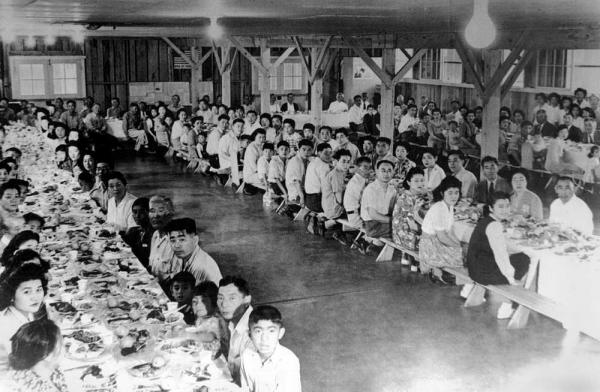On February of 1942 ordered the executive order 9066 which started the Japanese Internment. Soon over 125,000 people were loaded into interment camps, some half of them children and young adults. What many Japanese Americans believed to be a couple months turned out to be years of exile by the American government.
Life on camp was far from pleasant. The camps were bare and sparsely filled. Houses were barley built, made often of wood nailed together like a camp ground. The area was a dessert, and there weren't any green hills to run and play on. For many of the internment camp participants, it felt more like a military expierence than a household one. Rooms had bunkbeds and "houses" had no running water in them. People took their meals in food hauls at specific times, and there was very little choice in what you ate. Although physical intimidation or harm was "rare" the process of being watched and the constant confusion of the situation most likely plagued many Japanese Americans.
Children were sent off to school each day, and adults had set jobs for them to do. Many camps had their own newspapers, governing councils, and different departments.
Many Japanese-Americans tried to protest the interment since not only was it against the US constitution but many Japanese-Americans fought in World War 2.
The Internment camps now pose as a reminder of our American History. It is important to remember these moments to remind us of our past faults and to not repeat history once more.
Source :
https://www.loc.gov/teachers/classroommaterials/presentationsandactivities/presentations/immigration/alt/japanese4.html


Very interesting post giving detail to a general idea we learned about in class. I wonder if you could give more information on the effect of people thinking they were only going for a few months. Did this cause them to leave necessities behind? At what point did people realize it was longer term? What effect did this realization have?
ReplyDeleteIntriguing post on Japanese internment. It is truly tragic how war hysteria can cause our country, a nation founded on equality, to segregate our own citizens based on their ethnicity. Though we are far into the future, we still see this discrimination today. The recent executive order essentially banned people from entering our country because they are Muslim. This can be traced to the fear that some people have over Islamic extremist groups. However, perhaps we are looking at this the wrong way–maybe the Muslims in our country are spies like the Japanese-Americans were in World War II, which is to say not at all. For a more in-depth comparison, go to: http://www.nbcnews.com/news/asian-america/some-trump-s-immigration-ban-parallels-past-anti-asian-policies-n714091
ReplyDeleteInteresting read - I thought that you did a good job explaining the causes and effects of the camps and describing the typical life at an internment camp. Adding on to your idea that the camps were a military experience, I think that, in some ways, people tried to make camp life more of a home-like experience; for instance, they participated in traditional Japanese arts and crafts classes that were taught at the camps.
ReplyDelete